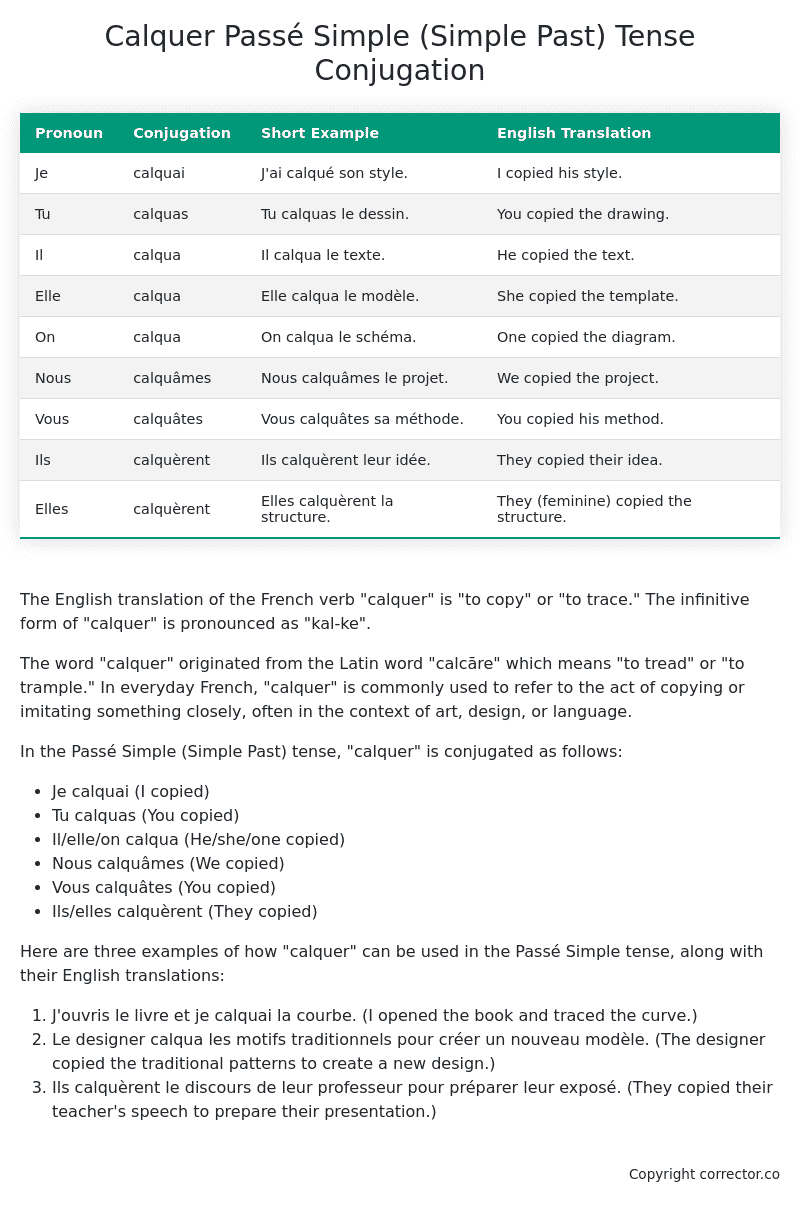Passé Simple (Simple Past) Tense Conjugation of the French Verb calquer
Introduction to the verb calquer
The English translation of the French verb “calquer” is “to copy” or “to trace.” The infinitive form of “calquer” is pronounced as “kal-ke”.
The word “calquer” originated from the Latin word “calcāre” which means “to tread” or “to trample.” In everyday French, “calquer” is commonly used to refer to the act of copying or imitating something closely, often in the context of art, design, or language.
In the Passé Simple (Simple Past) tense, “calquer” is conjugated as follows:
- Je calquai (I copied)
- Tu calquas (You copied)
- Il/elle/on calqua (He/she/one copied)
- Nous calquâmes (We copied)
- Vous calquâtes (You copied)
- Ils/elles calquèrent (They copied)
Here are three examples of how “calquer” can be used in the Passé Simple tense, along with their English translations:
- J’ouvris le livre et je calquai la courbe. (I opened the book and traced the curve.)
- Le designer calqua les motifs traditionnels pour créer un nouveau modèle. (The designer copied the traditional patterns to create a new design.)
- Ils calquèrent le discours de leur professeur pour préparer leur exposé. (They copied their teacher’s speech to prepare their presentation.)
Table of the Passé Simple (Simple Past) Tense Conjugation of calquer
| Pronoun | Conjugation | Short Example | English Translation |
|---|---|---|---|
| Je | calquai | J’ai calqué son style. | I copied his style. |
| Tu | calquas | Tu calquas le dessin. | You copied the drawing. |
| Il | calqua | Il calqua le texte. | He copied the text. |
| Elle | calqua | Elle calqua le modèle. | She copied the template. |
| On | calqua | On calqua le schéma. | One copied the diagram. |
| Nous | calquâmes | Nous calquâmes le projet. | We copied the project. |
| Vous | calquâtes | Vous calquâtes sa méthode. | You copied his method. |
| Ils | calquèrent | Ils calquèrent leur idée. | They copied their idea. |
| Elles | calquèrent | Elles calquèrent la structure. | They (feminine) copied the structure. |
Other Conjugations for Calquer.
Le Present (Present Tense) Conjugation of the French Verb calquer
Imparfait (Imperfect) Tense Conjugation of the French Verb calquer
Passé Simple (Simple Past) Tense Conjugation of the French Verb calquer (You’re reading it right now!)
Passé Composé (Present Perfect) Tense Conjugation of the French Verb calquer
Futur Simple (Simple Future) Tense Conjugation of the French Verb calquer
Futur Proche (Near Future) Tense Conjugation of the French Verb calquer
Plus-que-parfait (Pluperfect) Tense Conjugation of the French Verb calquer
Passé Antérieur (Past Anterior) Tense Conjugation of the French Verb calquer
Futur Antérieur (Future Anterior) Tense Conjugation of the French Verb calquer
Subjonctif Présent (Subjunctive Present) Tense Conjugation of the French Verb calquer
Subjonctif Passé (Subjunctive Past) Tense Conjugation of the French Verb calquer
Subjonctif Imparfait (Subjunctive Imperfect) Tense Conjugation of the French Verb calquer
Subjonctif Plus-que-parfait (Subjunctive Pluperfect) Tense Conjugation of the French Verb calquer
Conditionnel Présent (Conditional Present) Tense Conjugation of the French Verb calquer
Conditionnel Passé (Conditional Past) Tense Conjugation of the French Verb calquer
Conditionnel Passé II (Conditional Past II) Tense Conjugation of the French Verb calquer
L’impératif Présent (Imperative Present) Tense Conjugation of the French Verb calquer
L’impératif Passé (Imperative Past) Tense Conjugation of the French Verb calquer
L’infinitif Présent (Infinitive Present) Tense Conjugation of the French Verb calquer
L’infinitif Passé (Infinitive Past) Tense Conjugation of the French Verb calquer
Le Participe Présent (Present Participle) Tense Conjugation of the French Verb calquer
Le Participe Passé (Past Participle) Tense Conjugation of the French Verb calquer
Struggling with French verbs or the language in general? Why not use our free French Grammar Checker – no registration required!
Get a FREE Download Study Sheet of this Conjugation 🔥
Simply right click the image below, click “save image” and get your free reference for the calquer Passé Simple tense conjugation!

Calquer – About the French Passé Simple (Simple Past) Tense
Formation
Usage
Narration
Historical Context
Interactions with other tenses
Passé Composé
Imparfait
Conditional and Subjunctive
Summary
I hope you enjoyed this article on the verb calquer. Still in a learning mood? Check out another TOTALLY random French verb conjugation!


